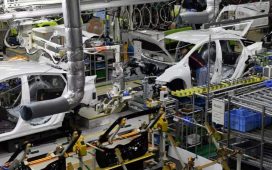Britons will need to get used to hearing the words “no growth” with the economy in trouble and no credible plan to save it, a business owner has said.
The economy flatlined in the third quarter of this year with the Office for National Statistics reporting GDP growth in the July-to-September period was zero compared to the previous quarter.
All sectors, including manufacturing and construction, broadly showed the same subdued picture, though despite the damning headline figure, the quarterly outcome was slightly ahead of analysts’ expectations for a modest decline in output.
News of the economic stagnation sparked criticism of the Government, with small business owners lining up to express their anger.
Riz Malik, Founder and Director of R3 Mortgages, said: “The term ‘no growth’ is unfortunately something we are going to have to get used to hearing over the next couple years.
“Our economy is in trouble and there is no credible plan to save it, at least from this administration.”
The Bank of England has already warned the UK could face zero growth until 2025, but is likely to avoid a recession.
Analysts had predicted a 0.2 percent fall for the quarter and a flat reading for September. But the ONS reported 0.2 percent growth in the economy for the month of September, amid a boost from the film production, health and education industries.
The ONS also revised down growth in August to 0.1 percent, from 0.2 percent, and reported a 0.6 percent decline for July.
Samuel Mather-Holgate, an independent financial advisor at Mather and Murray Financial, said after a summer of sheer misery for UK plc, it was “good” to see some growth in September, “however measly”.
He added: “This should not be taken as vindication that (Prime Minister Rishi) Sunak and (Chancellor Jeremy) Hunt’s plans for the economy are working, as they will try and say.
“It couldn’t be further from the truth. This rudderless Government has no plan to benchmark their success against and are wandering into the abyss. Sadly, they don’t even know it.”
Mr Hunt, commenting on the figures, said high inflation is the single greatest barrier to economic growth, adding: “The best way to sustainably grow our economy right now is stick to our plan and knock inflation on its head.”
He added that the Autumn Statement on November 22 will focus on how to get the economy growing healthily again by “unlocking investment, getting people back into work and reforming our public services” to deliver the growth the country needs.
Shadow Chancellor Rachel Reeves said the figures were further evidence the economy is not working under the Conservatives and working people are worse off.
Economists said after the latest figures that Britain looks likely to avoid a recession despite concerns over the impact of recent significant interest hikes taken by the Bank of England in a bid to crack inflation.
Samuel Tombs, chief UK economist at Pantheon Macroeconomics, said: “The economy narrowly avoided contracting in Q3, and we continue to think that it can maintain this resilient performance in Q4.
“We continue to think that the chances of a recession look low; we look for a 0.3% quarter-on-quarter increase in GDP in Q4 and expect that pace to be broadly maintained next year.”
Rachel Hayward, Managing Director at Ask the Chameleon Ltd, said: “Rising costs, falling sales, and taxes rising. You don’t have to be an economist to see the impact.”
That impact is also being felt in the charity sector as households continue to tighten the purse strings amid the cost-of-living crisis.
Gemma Wilkes, Fundraising Manager at cancer counselling charity, We Hear You, in Frome, Somerset, said there are significant challenges facing the sector in the current climate.
She explained: “The economic stagnation seen between July and September is certainly being felt by many charities.
“A lack of funding and our supporters being under considerably more financial pressure, due to inflation and higher interest rates, is resulting in fewer donations.”
Ms Wilkes added: “The current economic climate is a bleak one for small charities, who rely on grants, trusts and community fundraising to provide vital services within their communities.”











